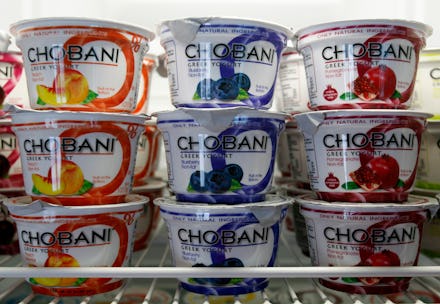How America's Love for Greek Yogurt Is Actually Hurting Greece

Would you be willing to buy a Greek yogurt brand if it was labeled "Greek-style yogurt" or even "I Can't Believe It's Not Greek Yogurt"?
The answer to this question might lead to over a billion dollars in Greek yogurt sales being reallocated from the U.S. to Greece. For this reason, Greece should ban Chobani from labeling its yogurt as "Greek" in U.S. markets.
Less than two months ago, Greek yogurt producer Fage won over a British court to ban Chobani from labeling its yogurt "Greek" in the U.K.
And last week the European Union (EU) demanded a ban on the use of European names in the U.S. regarding cheese made in America. Only cheese that is actually produced in Greece should called feta, EU officials argued in anticipation of EU-U.S. free trade agreement talks in Brussels.
Recent trade agreements between the EU and Canada have already restricted the use of certain cheese names that come from Europe. Under the EU-Canada agreement, feta cheese manufactured in Canada can only be labeled as "feta-like" or "feta-style," but not as "feta." And its producers can't use Greek letters or other symbols that evoke Greece.
Not to mention that in 2005, Greece won a case against Denmark and Germany that prohibited them from calling their cheese "feta" as well.
Image Credit: Wikimedia Commons. Products from Mevgal, a Greek brand of dairy products.
Clearly, this has been done before. But what does it mean for Americans?
The U.S. yogurt market is worth $7.4 billion, according to research firm Mintel. Upstate New York, with its 28 plants owned by Chobani, Greek brand Fage, Yoplait maker General Mills and others, has become something like the Silicon Valley of yogurt.
Once a niche business, Greek yogurt now makes up more than 40% percent of the U.S. yogurt market.
And Chobani, the leading Greek yogurt producer in the U.S., is contemplating expansion that will value the company at $5 billion.
But instead of boosting the Greek dairy industry at a time of severe financial crisis, Chobani's success is actually detracting from the Greek economy. The reason is that Chobani, the brand that accounts for about 38% of the dollars U.S. consumers spend on Greek yogurt, does not come from Greece.
The British court case provides some legal arguments that Greece could use to ban Chobani from labeling its yogurt as "Greek" in the U.S.
Chobani's defense is that the label "Greek yogurt" refers to the manufacturing process — the straining — not the geographical location of production. Through the straining process, the yogurt gets the characteristic creamy texture that consumers love. It also gets the nutritious protein-packed composition that has turned it into an acclaimed superfood.
Image Credit: Wikimedia Commons. Yogurt being strained.
The British court sided with the Greek brand and granted an injunction that prevented Chobani from using the "Greek yogurt" label in the U.K. Chobani appealed the decision but lost. Going forward, it will have to label its product "Greek-style" when marketing in the United Kingdom.
Obviously the U.S. and the U.K. do not have identical legislation. But this doesn't mean that a case would be immediately dismissed in the U.S. According to the World International Property Organization, geographical indications should be protected by the law all over the world. The main reason is that they are understood by consumers to denote the origin and the quality of products.
Under this rationale, when foreign producers use a name of origin on their labels, "legitimate" producers are deprived of valuable business and the established reputation of their products is damaged.
In the U.S., the legal protection for some geographical indications is similar to the protection of trademarks. In fact, some states have moved aggressively to protect their own products of origin through registering a trademark. Georgia holds the trademark of Vidalia onions, Florida has trademarked the Sunshine Tree that is associated with its oranges and Idaho owns the trademark for its potatoes.
In these cases, the states have registered trademarks and then allowed their growers to use the term, while denying its use to others. So if onions and potatoes are protected, why not yogurt as well?
America's yogurt eating habits may change if Greece decides to fight for the "Greek-ness" of dairy products. And this will translate in billions of earnings for a crisis-ridden country's economy.